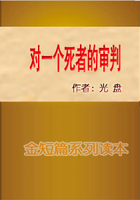Returning to the autumn of 1598, an event now happened to sever for a time Jonson's relations with Henslowe. In a letter to Alleyn, dated September 26 of that year, Henslowe writes: "I have lost one of my company that hurteth me greatly; that is Gabriel [Spencer], for he is slain in Hogsden fields by the hands of Benjamin Jonson, bricklayer." The last word is perhaps Henslowe's thrust at Jonson in his displeasure rather than a designation of his actual continuance at his trade up to this time. It is fair to Jonson to remark however, that his adversary appears to have been a notorious fire-eater who had shortly before killed one Feeke in a similar squabble. Duelling was a frequent occurrence of the time among gentlemen and the nobility; it was an imprudent breach of the peace on the part of a player. This duel is the one which Jonson described years after to Drummond, and for it Jonson was duly arraigned at Old Bailey, tried, and convicted. He was sent to prison and such goods and chattels as he had "were forfeited." It is a thought to give one pause that, but for the ancient law permitting convicted felons to plead, as it was called, the benefit of clergy, Jonson might have been hanged for this deed. The circumstance that the poet could read and write saved him; and he received only a brand of the letter "T," for Tyburn, on his left thumb. While in jail Jonson became a Roman Catholic; but he returned to the faith of the Church of England a dozen years later.
On his release, in disgrace with Henslowe and his former associates, Jonson offered his services as a playwright to Henslowe's rivals, the Lord Chamberlain's company, in which Shakespeare was a prominent shareholder. Atradition of long standing, though not susceptible of proof in a court of law, narrates that Jonson had submitted the manuscript of "Every Man in His Humour" to the Chamberlain's men and had received from the company a refusal; that Shakespeare called him back, read the play himself, and at once accepted it. Whether this story is true or not, certain it is that "Every Man in His Humour" was accepted by Shakespeare's company and acted for the first time in 1598, with Shakespeare taking a part. The evidence of this is contained in the list of actors prefixed to the comedy in the folio of Jonson's works, 1616. But it is a mistake to infer, because Shakespeare's name stands first in the list of actors and the elder Kno'well first in the 'dramatis personae', that Shakespeare took that particular part. The order of a list of Elizabethan players was generally that of their importance or priority as shareholders in the company and seldom if ever corresponded to the list of characters.
"Every Man in His Humour" was an immediate success, and with it Jonson's reputation as one of the leading dramatists of his time was established once and for all. This could have been by no means Jonson's earliest comedy, and we have just learned that he was already reputed one of "our best in tragedy." Indeed, one of Jonson's extant comedies, "The Case is Altered," but one never claimed by him or published as his, must certainly have preceded "Every Man in His Humour" on the stage. The former play may be described as a comedy modelled on the Latin plays of Plautus. (It combines, in fact, situations derived from the "Captivi" and the "Aulularia" of that dramatist). But the pretty story of the beggar-maiden, Rachel, and her suitors, Jonson found, not among the classics, but in the ideals of romantic love which Shakespeare had already popularised on the stage. Jonson never again produced so fresh and lovable a feminine personage as Rachel, although in other respects "The Case is Altered" is not a conspicuous play, and, save for the satirising of Antony Munday in the person of Antonio Balladino and Gabriel Harvey as well, is perhaps the least characteristic of the comedies of Jonson.
"Every Man in His Humour," probably first acted late in the summer of 1598and at the Curtain, is commonly regarded as an epoch-making play; and this view is not unjustified. As to plot, it tells little more than how an intercepted letter enabled a father to follow his supposedly studious son to London, and there observe his life with the gallants of the time. The real quality of this comedy is in its personages and in the theory upon which they are conceived. Ben Jonson had theories about poetry and the drama, and he was neither chary in talking of them nor in experimenting with them in his plays. This makes Jonson, like Dryden in his time, and Wordsworth much later, an author to reckon with; particularly when we remember that many of Jonson's notions came for a time definitely to prevail and to modify the whole trend of English poetry. First of all Jonson was a classicist, that is, he believed in restraint and precedent in art in opposition to the prevalent ungoverned and irresponsible Renaissance spirit. Jonson believed that there was a professional way of doing things which might be reached by a study of the best examples, and he found these examples for the most part among the ancients. To confine our attention to the drama, Jonson objected to the amateurishness and haphazard nature of many contemporary plays, and set himself to do something different; and the first and most striking thing that he evolved was his conception and practice of the comedy of humours.
As Jonson has been much misrepresented in this matter, let us quote his own words as to "humour." A humour, according to Jonson, was a bias of disposition, a warp, so to speak, in character by which "Some one peculiar quality Doth so possess a man, that it doth draw All his affects, his spirits, and his powers, In their confluctions, all to run one way."But continuing, Jonson is careful to add:
"But that a rook by wearing a pied feather, The cable hat-band, or the three-piled ruff, A yard of shoe-tie, or the Switzers knot On his French garters, should affect a humour!
O, it is more than most ridiculous."















